|
|
|
Sort Order |
|
|
|
Items / Page
|
|
|
|
|
|
|
| Srl | Item |
| 1 |
ID:
146528


|
|
|
|
|
| Summary/Abstract |
This article attempts to answer the puzzle of why, amongst undemocratic states, some regimes are more authoritarian than others. The author contends that differing party structures result in different authoritarian outcomes. A ruling, competitive authoritarian regime that has a party structure akin to a cadre party, or where there is little or no intra-party democracy, is more likely to be more authoritarian than a party which has intra-party democracy. The lack or absence of intra-party democracy ensures that elites remain cohesive and that there are lesser opportunities for the opposition to take advantage of divisions in the party, whereas in a party with intra-party democracy, there is a greater possibility of elite disunity, which could be capitalised on by the opposition, and there is also a greater likelihood of a different ideology being propagated by defectors from the party. The cases of the People's Action Party in Singapore and the United Malays National Organization in Malaysia are used to illustrate the author's case.
|
|
|
|
|
|
|
|
|
|
|
|
|
|
|
|
| 2 |
ID:
146521
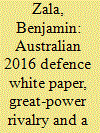

|
|
|
|
|
| Summary/Abstract |
This piece is an imagined email correspondence between three renowned international relations scholars, E. H. Carr, Hedley Bull and Coral Bell, who are discussing the Australian 2016 Defence White Paper. The purpose of such an exercise is to reflect on the ‘big-picture’ international relations questions posed by what might otherwise be thought of as a relatively technical defence policy document. In particular, the correspondence between the three focuses on the central importance of the White Paper’s assumptions of a ‘rules-based global order’ and the relationship between this order and US power. In their time, all three authors spoke directly to questions of power, law and order in their scholarly work, which had been deeply influenced, in all three cases, by periods spent working at the ‘coalface’ of these issues in government in Britain and Australia. As such, Carr, Bull and Bell have much to say about how Australia is positioning itself for a post-unipolar world.
|
|
|
|
|
|
|
|
|
|
|
|
|
|
|
|
| 3 |
ID:
146522
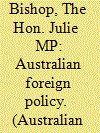

|
|
|
|
|
| Summary/Abstract |
Supported by one of the most professional and dedicated foreign policy bureaucracies in the world, one can rely on any Australian government that wins office to perform its duty to represent our country in a diligent and tireless manner. The difference lies in whether a government entering or returning to office is offering a credible vision of what the country’s most important national interests might be, and a sound and practical understanding of how best to advance such interests on behalf of the Australian population.
|
|
|
|
|
|
|
|
|
|
|
|
|
|
|
|
| 4 |
ID:
146523
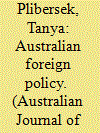

|
|
|
|
|
| Summary/Abstract |
Mainstream thinking accepts that the main tenets of Australian foreign policy are the US alliance, engagement with the Indo-Pacific and our global interests. We differ over emphasis and approach, but we are fortunate to have broad agreement on the component parts. This is one reason why foreign policy often plays a marginal role in Australian election campaigns—elections are designed to amplify difference. Foreign policy is most often about continuity and seeking common ground.
|
|
|
|
|
|
|
|
|
|
|
|
|
|
|
|
| 5 |
ID:
146524
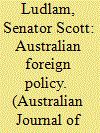

|
|
|
|
|
| Summary/Abstract |
Election campaigns are mostly argued on the basis of local issues that have direct impacts on our community—so much so that the phrase ‘all politics is local’ is considered self-evident. However, some things are missed in our three-year electoral cycle. The biggest gap in our national conversation is the place of Australia in the world. Foreign policy takes a back seat during an election, and if it presents at all, it is as caricature.
|
|
|
|
|
|
|
|
|
|
|
|
|
|
|
|
| 6 |
ID:
146526
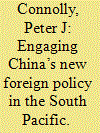

|
|
|
|
|
| Summary/Abstract |
China’s declared foreign policy of ‘non-interference’ is contradicted by its actions in recent times. Beyond activities in the East and South China Seas, the involvement of China in negotiations on the Korean Peninsula, the evacuation of Chinese citizens from various crises, and the deployment of Chinese combat troops to peacekeeping missions in Africa have indicated China’s growing interests in the shape of world affairs, coinciding with a growing economic and military capacity to influence them. Much attention has been given to the potential consequences of great-power competition between the USA and China, but little focus has been given to the impact these trends may have in the outlying regions of Chinese foreign policy. One such place is Melanesia in the South Pacific—a subregion where a small influence from a Chinese perspective can have a significant impact on Pacific Island Countries. This article postulates that, over time, there is potential for the consequences of Chinese interests to lead to accidental friction, and suggests that this risk can be mitigated through increased cooperation.
|
|
|
|
|
|
|
|
|
|
|
|
|
|
|
|
| 7 |
ID:
146525
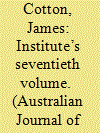

|
|
|
|
|
| Summary/Abstract |
Australian Outlook, published initially in 1947, was Australia’s first journal devoted exclusively to the analysis of Australia’s foreign relations and of international affairs. It emerged from a context where nationalist and internationalist sentiments were taking on new prominence and in a time of heightened public awareness of global issues. The journal came to provide a unique venue for academic and expert commentary, especially on the international politics of Australia’s region, as well as on a wide range of topics from defence and trade to great-power dynamics. Early contributions demonstrated a generally sound—and sometimes remarkably prescient—grasp of regional and international trends. The journal built on earlier Australian Institute of International Affairs publications—notably, the Austral-Asiatic Bulletin, inaugurated in 1937.
|
|
|
|
|
|
|
|
|
|
|
|
|
|
|
|
| 8 |
ID:
146529
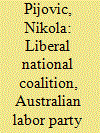

|
|
|
|
|
| Summary/Abstract |
The issue of bipartisanship in Australian foreign policy is not often substantially addressed. The country’s relations with the world appear to exhibit strong continuity regardless of the political party in government. And yet, when it comes to engagement with African states and issues, the last two decades have seen highly prominent partisan differences in Australian foreign policy. This article utilises the example of Australia’s foreign policy engagement with Africa to argue that there may be two levels of understanding bipartisanship in Australian foreign policy. On the one hand, aimed at relationships and issues perceived to be of primal and significant security and economic well-being for the country, Australian foreign policy does indeed appear to be bipartisan. However, aimed at relationships and issues that have traditionally been perceived as holding minimal security and economic interest and importance for the country, Australian foreign policy does exhibit partisanship.
|
|
|
|
|
|
|
|
|
|
|
|
|
|
|
|
| 9 |
ID:
146530


|
|
|
|
|
| Summary/Abstract |
This article argues that China’s approach to Afghanistan since the end of the Cold War has been shaped by the desire both for security in Xinjiang and for geopolitical advantage in Central Asia. While Beijing’s Xinjiang calculus was ascendant from 1991 to 2001, since 2001 a broader geopolitical calculus has emerged. This latter factor has been encapsulated in President Xi Jinping’s ‘One Belt, One Road’ strategy, which, at its core, is an outgrowth of Beijing’s decades-long agenda to integrate Xinjiang and utilise this region’s unique geopolitical position to facilitate a China-centric Eurasian geo-economic system. While China’s Xinjiang calculus determines that it shares an interest with the USA in combating radical Islamism in Afghanistan (and Central Asia more broadly), the geopolitical calculus of the ‘One Belt, One Road’ strategy points to a fundamental incompatibility between US and Chinese interests.
|
|
|
|
|
|
|
|
|
|
|
|
|
|
|
|
| 10 |
ID:
146527
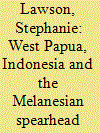

|
|
|
|
|
| Summary/Abstract |
The idea of a shared Melanesian identity has been consolidated over the last three decades or so through the most important subregional organisation in the South-West Pacific—the Melanesian Spearhead Group (MSG). The solidarity of this group has been strained over various issues from time to time, but none is as fraught as the Indonesian occupation of what is commonly known as West Papua, whose indigenous Papuan people are ethnically Melanesian. In addition to recounting the Indonesian takeover of West Papua in the context of the dynamics of decolonisation, the Cold War and early regional development, the article examines the emergence of Melanesian identity and the MSG, before considering more recent developments. These focus on a recent bid by West Papuans for MSG membership, key aspects of Indonesia's role in the Melanesian subregion, and the extent to which these developments highlight competing logics in regional and international politics.
|
|
|
|
|
|
|
|
|
|
|
|
|
|
|
|
|
|
|
|
|